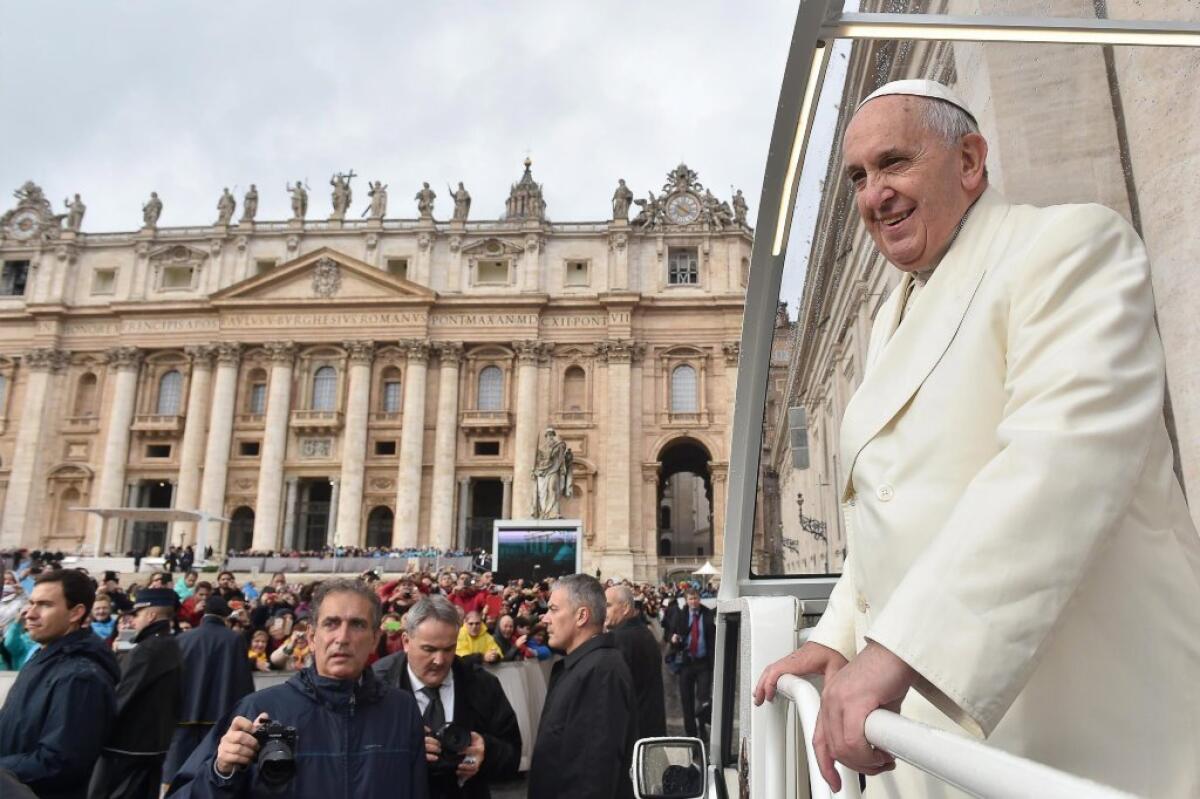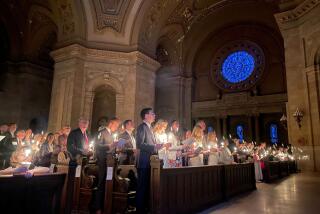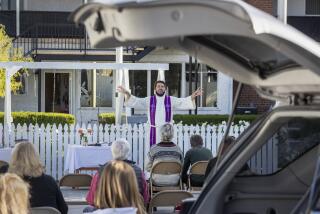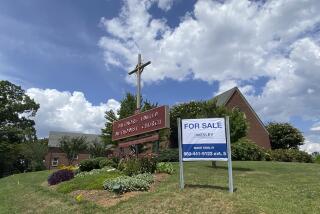Editorial: Closing houses of worship during the pandemic is an act of faith and charity

- Share via
Among the other disruptions caused by the COVID-19 pandemic has been the closing of houses of worship and the cancellation of religious gatherings. The arrival of what could be called spiritual distancing was powerfully symbolized last week by images of Pope Francis offering a blessing to an empty St. Peter’s Square. Christians around the world in the coming weeks will be “attending” Easter services via YouTube and Jews will be participating in Passover seders on Zoom.
The alacrity with which mainstream religious groups have responded to the pandemic is admirable, but the idea of suspending public worship also has provoked dissent. We’re referring not only to a handful of religious leaders who have behaved recklessly in holding services in defiance of social distancing norms or government decrees, but also to those clergy members and commentators who, without advocating violation of the law, have questioned the idea.
For example, Cardinal Raymond Burke, the former archbishop of St. Louis and onetime Vatican official who is a hero of conservative Catholics, has criticized the closing of churches for worship — undertaken in some cases even before civil authorities acted to shut down public meetings. (The California Catholic Conference announced a suspension of public celebrations of Mass on March 18, a day before Gov. Gavin Newsom ordered Californians to stay at home.)
“Even as we have found a way to provide for food and medicine and other necessities of life during a time of contagion, without irresponsibly risking the spread of the contagion, so, in a similar way, we can find a way to provide for the necessities of our spiritual life,” Burke wrote on his blog on March 21. He suggested that worshipers could gather in large churches “without violating the requirements of social distance,” a debatable proposition at best.
A similar argument was proposed in a March 13 article in Foreign Policy magazine by Lyman Stone, a research fellow at the Institute for Family Studies and a Lutheran. Stone suggested that the lesson of Christian responses to plagues over the years is: “We don’t cancel church.”
Stone, who wrote a handbook that suggests ways for churches to continue to meet in small groups, further argued: “Even as we take Communion from separate plates and cups to minimize risk, forgo hand-shaking or hugging, and sit at a distance from each other, we still commune.” He also suggested that continuing church services would serve as “a societal roll call, especially for older people: Those who don’t show up should be checked on during the week.”
(The idea that religious services are vital isn’t confined to members of the clergy and commentators. When Florida Gov. Ron DeSantis on Wednesday belatedly issued a stay-at-home order, he included attending religious services as one of the “essential activities” exempt from the order.)
Arguments against suspending worship aren’t just a variation on President Trump’s “aspiration” that American churches would be filled on Easter as part of an expedited economic revitalization. Trump was later persuaded that this wasn’t a good idea.
Many who worry about closing churches or suspending services aren’t cheerleaders for capitalism; they want to defend religious values. Those values include fellowship with other believers — it was an Anglican priest who wrote that “no man is an island” — and of course contact with God. As Burke put it: “In considering what is needed to live, we must not forget that our first consideration is our relationship with God.”
Of course a religious leader would say that. But the bishops and pastors who have decided to close churches for the time being in the interest of public health are also acting on a religious impulse, a reverence for human life.
In an editorial written partly as a response to Stone, the magazine Christianity Today made a powerful case for erring on the side of safety.
The editorial argued that “even if we do practice stringent hygiene and social distancing, coming together as congregations in the face of this pandemic actually mars our witness. Rather than looking courageous and faithful, we come off looking callous and even foolish, not unlike the snake handlers who insisted on playing with poison as a proof of true faith.” It added: “The church remains the church online, too.”
The same can be said of other faiths that must worship virtually as the price of protecting themselves and others from a rampant virus. In time, churches, synagogues, mosques and private homes will again be filled with worshipers. But it would be tragic — and fundamentally irreligious — to rush that return to normalcy and risk human lives.
More to Read
A cure for the common opinion
Get thought-provoking perspectives with our weekly newsletter.
You may occasionally receive promotional content from the Los Angeles Times.










